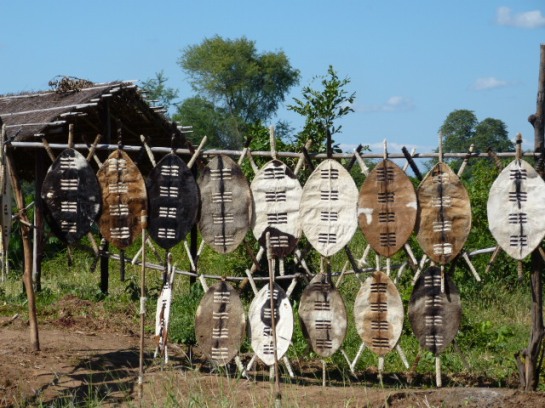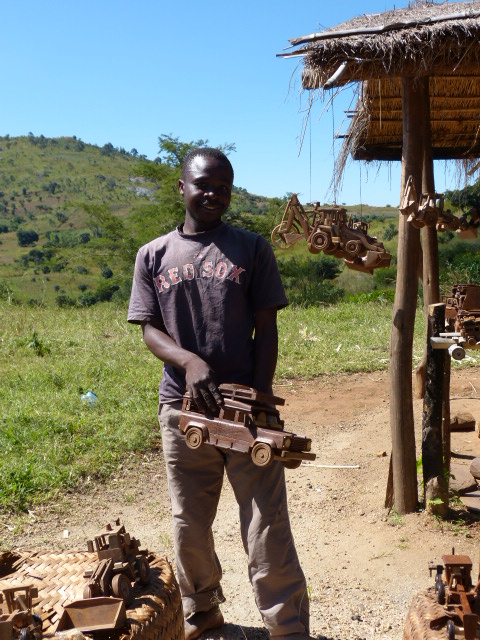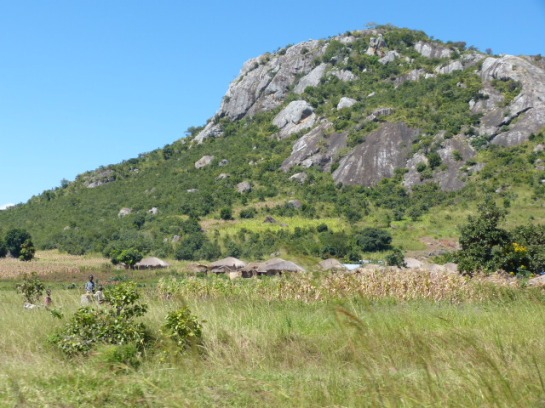Saturday April 21st – Today we headed South from Lilongwe on a 3 hour drive to the small town of Mangochi (pronounced Mangosh) which is on the shores of Lake Malawi. We stayed in a beachfront room at the Nkopolo Resort. We were fortunate enough to have a car and driver for the weekend. Dougras is a FINCOOP driver and agreed to take us for the weekend. We asked him if he wanted to bring a friend along to keep him company, so along came Gift, one of his best friends.
The drive to Mangochi was like reading a National Geographic article about Malawi, but actually being in the pictures. We saw the true “heart of Africa” on this weekend journey.
We drove through many, many small towns and villages in the rural countryside. Our eyes couldn’t take everything in fast enough. Our first thought was how much the countryside changes as soon as you leave the city. It is quite mountainous and very green and lush, complete with a huge waterfall on the hillside. Some of the many sights we saw were:
- young children splashing naked in the riverbeds
- families washing their clothes in the streams
- mud huts with thatched roofs in groups in villages and on the sides of the road on a farmer’s plot of land
- funeral in a small village with hundreds of people dressed in their best clothes standing in the corn field, paying their respects
- 3 generations of farmers on a cart being pulled by a team of oxen; grandfather, son and grandson
- endless streams of people walking and biking for miles and miles in the middle of nowhere, far away from any village
- men trying their best to push their bicycles, heavily laden with huge loads of wood or maize, to their home or market
- groups of women heading into the fields with their baskets on their heads, to harvest whatever crop was ready
- roadside stands with whatever they had to sell, mostly sweet potatoes, Irish potatoes, cucumbers, pumpkins, maize and the most beautiful tomatoes you have ever seen.
- sometimes just a single metal pan on the roadside with their meager crop, which might be 2 or 3 watermelon, a pumpkin, just a few tomatoes or a handful of Irish potatoes. Whatever they could find to sell to bring in some kwacha for the day.
- goat herders tending their goats. Children as young as 5 years old were mainly given this responsibility.
- mothers with their small children walking dutifully behind them in a row, all with their full baskets balanced on their heads.
- children as young as 2 years old instinctively knowing to stay off the road, as cars fly past them with just a quick honk of the horn, telling them to get out of the way.
- families filling their buckets with clean water using the many wells and pumps that have been installed over the years by charity organizations.
- children playing in slews of stagnant water, without the education to know of the potential diseases this might cause
- huge “termite hills” all over the landscape, between 6-12 feet high
- toy-makers on the roadsides with stands of the most beautifully carved wooden toys, selling to whoever happens to drive by and will stop
- beautifully weaved baskets and mats, as well as wicker (rattan) furniture.













